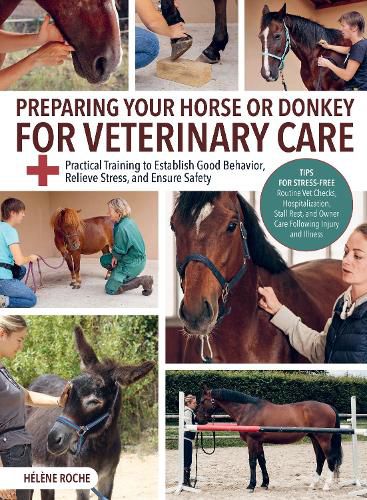Readings Newsletter
Become a Readings Member to make your shopping experience even easier.
Sign in or sign up for free!
You’re not far away from qualifying for FREE standard shipping within Australia
You’ve qualified for FREE standard shipping within Australia
The cart is loading…






Equine behavior expert and trained ethologist Helene Roche provides a practical, fair, and scientifically researched set of techniques to help train your horse or donkey to "cooperate for care." Specifically, her goal is to ensure that veterinary examinations, treatment administration, and health monitoring are safer, easier, and less stressful for all involved.
Making the decision to prepare your equine to cooperate for care will save you valuable time, as well as improving the quality of your relationship with your horse or donkey (and veterinarian, too!). With small steps that can be regularly incorporated into daily activities, your horse can learn to accept:
In addition, readers learn how to identify a problem that might need medical care, and how to recognize pain, fear, and impatience in horses and donkeys. With helpful hints on preparing for a veterinary visit, both at your home barn or at a clinic, as well as preparing for hospitalization or long-term stall-rest, this highly illustrated reference is an invaluable starter kit for remarkably better interactions with your horse as you work toward his improved health and well-being.
$9.00 standard shipping within Australia
FREE standard shipping within Australia for orders over $100.00
Express & International shipping calculated at checkout
Equine behavior expert and trained ethologist Helene Roche provides a practical, fair, and scientifically researched set of techniques to help train your horse or donkey to "cooperate for care." Specifically, her goal is to ensure that veterinary examinations, treatment administration, and health monitoring are safer, easier, and less stressful for all involved.
Making the decision to prepare your equine to cooperate for care will save you valuable time, as well as improving the quality of your relationship with your horse or donkey (and veterinarian, too!). With small steps that can be regularly incorporated into daily activities, your horse can learn to accept:
In addition, readers learn how to identify a problem that might need medical care, and how to recognize pain, fear, and impatience in horses and donkeys. With helpful hints on preparing for a veterinary visit, both at your home barn or at a clinic, as well as preparing for hospitalization or long-term stall-rest, this highly illustrated reference is an invaluable starter kit for remarkably better interactions with your horse as you work toward his improved health and well-being.